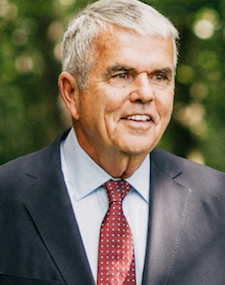By Don Keelan
Last month’s national newspapers reported that the international auditing firm Ernst & Young agreed to pay a $100 million fine to the Securities and Exchange Commission (SEC). It might be that the only place left to put our trust is in our national motto, “In God We Trust.”

Don Keelan
EY is a long-established, well-respected auditing, tax and consulting firm in over 140 countries and employs tens of thousands of professionals. It is referred to as “one of the Big Four,” meaning there are only four super-sized auditing firms. Before the mid-1990s, the firms were known as “the Big Eight.” One of them, Arthur Andersen & Co., went out of business in the 1990s due to the fallout of the Enron scandal. (In the interest of full disclosure, from September 1963 to June 1970, this columnist was on the audit staff of Arthur Andersen & Co. in NYC.) The three other firms merged.
For many investors in public and private companies, the four remaining firms are the last bastion of trust, knowing that the financial information disseminated by the company is accurate.
That trust shattered on June 27, 2022. It was reported by The Washington Post (and others) that “hundreds of auditors at accounting giant Ernst & Young cheated on ethics tests they were required to take to get or maintain their professional licenses, and the company withheld evidence of the misconduct from federal authorities investigating the matter.” The Post article further notes, “Ernst & Young admitted to the SEC’s charges and said it is complying with the agency’s penalty.”
Three years ago, on June 17, 2019, an SEC release reported that another of the Big Four was fined $ 50 million: “The SEC today charged KPMG LLP with altering past audit work after receiving stolen information about inspections of the firm that would be conducted by the Public Company Accounting Oversight Board (PCAOB). The SEC’s order also finds that numerous KPMG audit professionals cheated on internal training exams by improperly sharing answers and manipulating test results.”
Is it possible that the concept of trust has so little value? Between the scandals mentioned above, along the Hudson River and the Chesapeake Bay at West Point and the Naval Academy in 2021, scores of cadets and midshipmen cheated on exams. After an extensive investigation, several dozen cadets and midshipmen were expelled.
Trust or, better yet, the lack thereof, is apparent at so many other institutions, companies and governmental agencies. Our nation’s police services are a case in point. While significant criticism heaped upon our police is unfounded, much evidence supports the lack of trust directed at them. Unfortunately, the lack of trust has entered the hallowed halls of the FBI and other national institutions.
The COVID-19 pandemic revealed a great deal about where one places trust. The virus was indeed the culprit, but for millions of Americans, what surfaced was whom they trust: the government, medical advisors’ promulgation, or social media broadcasts?
No discussion on trust can ignore the enormous violation committed by the Catholic Church’s leaders when they allowed for the massive cover-up of the abuse of thousands of their flock.
What has been noted represents only a fraction of the hundreds of thousands who, on any given day, are doing their best in auditing companies, serving at our military academies or standing between us and a violent world. Not only should we have faith and trust in our national motto, but also we should not allow a tiny minority to distract us from knowing that trust has been and continues to be the foundation of our existence.
A colleague of mine stated a more eloquent solution: “Trust can be restored when one stops putting their own self-interest ahead of the institution they are there to serve — and along with it, the culture of silence needs to go.”
Don Keelan writes a bi-weekly column and lives in Arlington, Vermont.



Thank you Mr. Keelan for another thoughtful commentary.
My father, a WWII decorated combat veteran, was an accountant who worked for over 25 years for G.E. on government contracts for our nuclear powered submarine fleet. One of the lessons that he impressed on me was that while we could do what we want with our own money, public funds were a sacred trust and should be treated as such.
Your solution of holding all those who seek or hold public office to the standard that “that trust can be restored when one stops putting one’s own self -interest ahead of the institution they serve — and along with it the culture of silence needs to go” is a policy my father would have heartily approved.